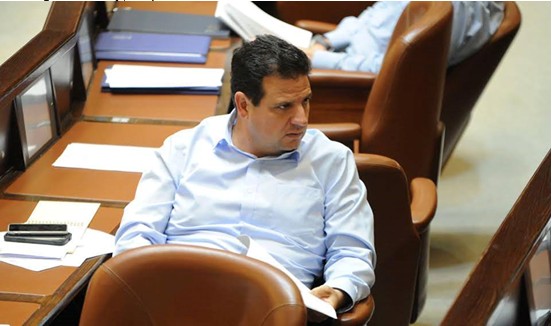Leaders of the Hadash and Balad parties have agreed to once again join forces in the coming November 1 election under the banner of the Joint List, as they have done since 2015. Ta’al, the third party in the alliance of Hadash and Arab parties, has yet to sign on. The deadline for submitting election slates is this coming Thursday, September 15.

Joint List leader, MK Ayman Odeh (Hadash) at the Knesset plenum (Photo: Joint List)
On Friday, the leaders of Hadash and Balad met at Communist Party of Israel headquarters in the northern city of Nazareth to strike the deal. The agreement puts to rest rumors of an independent Balad run that would have threatened to bury some of the parties below the 3.25 percent electoral threshold. The Joint List has been polling at some five-to-six seats.
Following elections in Israel, all elected parties send representatives to the president to make recommendations for their preferred candidate to form a government, and the latter then awards the mandate to do so to the candidate he believes is best positioned to do so.
The Joint List has traditionally not recommended anyone, in line with its general refusal to back Zionist parties, breaking that policy only once, in 2019, when it won 15 seats and backed Blue and White’s Benny Gantz, in an attempt to thwart a far-right Netanyahu government.
Joint List leader, MK Ayman Odeh (Hadash) said Saturday during an on-stage interview in Tira that the alliance would condition a recommendation to the president on various promises, such as support for a resumption of peace process with the Palestinians, abolition of the racist Nation-State law and crime-fighting. Leaders of the anti-Netanyahu bloc including Prime Minister Yair Lapid and Defense Minister Gantz “will need to sweat a lot” to get the Joint List’s recommendation, he said.
The political stalemate in Israel continued on Saturday evening as an election poll released on Channel 12’s “Meet the Press” program found that, if the elections were held now, no bloc could form a government. Netanyahu’s bloc remained at 59 seats, two shy of the coveted 61 needed to form a coalition. The bloc also received 59 seats in a Maariv poll published on Friday. No candidate has a clear path to power in the new poll. However, Israeli TV polls are often too small to accurately predict election results, with margins of error large enough to sway as many as five seats.
Related: https://maki.org.il/en/?p=30548


